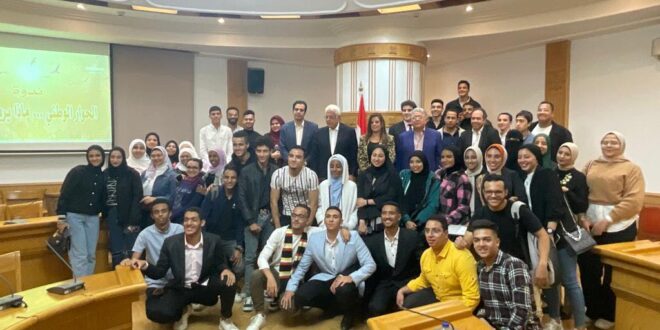At the kind invitation of Dr. Mona Al-Hadidi and the Youth Committee of the Supreme Council of Culture and within the framework of the desire for youth participation in the national dialogue, Dr. Hossam Badrawi gave a lecture in which he said;
Within the framework of changing the ruling intellectual premises for dealing with youth throughout the modern history of Egypt, the main pillars of the July 1952 revolution depended on the state apparatus playing the role of guardian of the ideas and visions of youth, and the intervention of the regime and its ruling popular organization, whatever its name, in defining the goals of working with youth, and marginalizing the role of youth Those who belong to any current or other orientation that has an opposition or even a different policy.
Likewise, attempts were made to reunite the youth, and did not continue, during Mubarak’s era, the most important of which was the Horus experiment, which was adopted by the Supreme Council for Youth and Sports.
Transform the Republican Palace to confront the demonstrations, and create a semi-regular army parallel to the police force that imposes obedience and punishes those who disagree with their ideology.
However, we believe that this vision, which its proponents thought was valid during the period of government during the three eras of the July Revolution, and then the era of the Brotherhood, is no longer valid during the transitional period and the stage of rebuilding it now. The sharp diversity of ideas and visions that society is witnessing represents a serious challenge in and of itself, and an opportunity at the same time.
Therefore, it becomes necessary to formulate a new general policy for youth, to which the state apparatus adheres, and the parties concerned with drawing up and implementing this policy, as well as the youth themselves, participate in its formulation.
And the necessity of confronting and dealing with the sharp political and religious polarization that exists in society.
The formulation of this policy faces a set of obstacles and challenges:
Challenges facing the state policy for youth:
1- The first challenge lies in who has the right to set the state’s youth policy.
Profitable and not-for-profit.
The origin is to create a natural base of young people who respect considerations of merit and competence to hold public positions away from direct state interference in employment (except in the narrowest limits).
If the youth can have a comprehensive meaning, it is not limited to the availability of a budgetal shares, but it will come back to the climate of creation of opportunities (the employee of the state created opportunities and not to be fun), and opens the doors of transparency in the youth. The challenge is to bring stakeholders together. suit the needs of each segment of them.
Some think that there is no need to set state policies for youth, because they represent 60% of the people, so all state policies are directed at them in any case.
The third challenge is the rooting of a culture of dependence on the father and mother state that spends, subsidizes, employs and guarantees, which is not possible in all economies of the world, let alone in countries that spend more than they produce.
The fourth challenge is a dual challenge, which is represented in the small number of youth civil associations that are entrusted with discussing and implementing these policies, if they were set, and the ruling regime’s lack of confidence in these few associations and security’s apprehension about the youth’s participation, which then allowed them to participate in any activity.
This challenge also includes the lack of a legislative framework that allows the participation of Internet activists and actors in youth initiatives in an institutional capacity, away from their personal selves.
The fifth challenge is the unsustainability of any policy in the
 Hossam Badrawi Official Website
Hossam Badrawi Official Website


